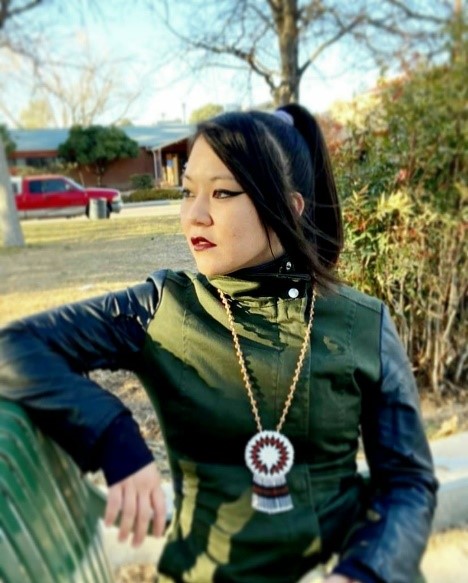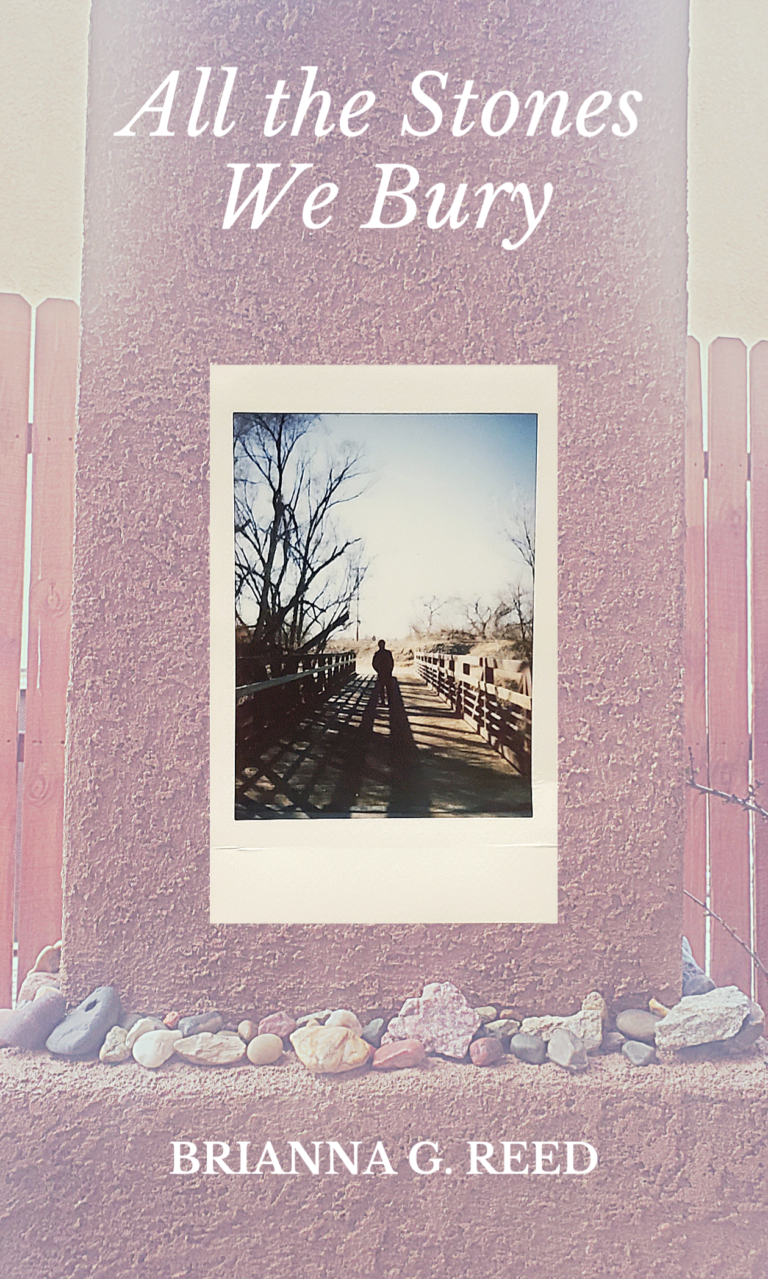
Stonebodies
Stonebodies
Atop the hill, my breath a steaming smokestack, I kick the stand, kill the switch, pull the key…
Thousand Tiny Heartbeats
My mouth filled up with seaglass, and I could almost taste saltwater…
Now remember, my teacher reassured us, these rocks are not pets. You each selected them for one reason: to listen. With his words, I looked at the tiny lump of sediment perched right next to my laptop. Listen to a rock? What? I was bewildered, but nonetheless took you up in my hands. You were cold to the touch, but grew warmer with each passing second you were cradled in my hand. Like a tiny heartbeat, I could feel you slowly letting yourself open to me.
I’d remembered the moments before, walking around puzzled at the idea of finding you. Take your time and choose carefully, Doug had said before unleashing us onto the dancing circle. There were dozens, if not hundreds, of gravel stones spreading out in each direction. None seemed to be calling out over here, come to me. Before long, I felt the magnetic pull of a metal statue thrust among the rocks. Nestled in the bottom of the statue, a tangle of metal wires created an everlasting bonfire. Come here, I’d felt. I’d knelt down, inspecting the rocks surrounding me. Wedged in between two metal bonfire sticks, as if you’d crawled your way up there yourself, was you.
Now, I held your tiny life in my palm, feeling the electricity of your being striking up as if to say we have always been alive, you have only needed to listen. I’d turned you this way and that, trying to figure you out. You clearly had a tiny hump of back sloping over, and your flattened side was ragged and scarred. Feet, I felt you say. You could’ve been anything before you were fossilized into sediment. A tiny bear cub, toddling into existence; a little fish darting in and out of a creek, or a turtle’s head bobbing along a current’s swell.
The longer I held you, the more I could feel a warm sea-breeze gently sweeping my hair back. My mouth filled up with seaglass, and I could almost taste saltwater. You were nothing extraordinary, but I could feel all your lives springing into mind. Calcified, I’d heard in your heartbeat. Calcified shell. A shell broke through the waves I’d painted in my mind, and the squeal of a turtle broke the sound of waves crashing onto rocks. I wasn’t the shell, you’d said, worried I’d understood wrong. I was the sea, finding my way onto the back of a turtle shell, hardening. All at once, I saw the shell across years, young and hard before succumbing to time, softening and weakening, before finally breaking beneath stormy waves. You rose up with the tide before gliding onto shore.
I thought of the desert pooling out around us for thousands of miles, landlocked from anything resembling where you came from. Now, I could understand the shimmering green flecks peeking out along your slate-gray pockmarks. I felt a heavy pull tugging at me, and maybe I thought of my own journey being torn from Emerald Isle. Do you want to go back, I found myself murmuring to you, worried that your homesickness mirrored my own. Like the true earth, however, you held your ground. I may have not come here, you’d said, and I may have been pulled from water to shore, from shore to land, from land to truck, taken across thousands of miles, but I have always been where I needed to be, you answered.
Oh yeah? And where’s that? I asked, before biting my tongue in embarrassment, afraid my calloused questions offended you.
I have always been home. Something you could do well to find, you’d said. I was sad for a while, but it wasn’t for nothing. You found me among the metal branches of a bonfire, so that every morning I could wake among its dying embers as dawn rose. I have found my way to belong in a world that forces you to keep searching for that belonging, over and over. Yet, despite this, I have still found my way home. You will, too.
A weight sagged within me the longer I held you in my palm, but I realized it wasn’t sadness or aching at all; you were teaching me to carry the weight of the earth in my bones. The longer I held onto you, the more grounded I felt. I understood that, like you, I needed an anchor to ground myself from floating away.
You don’t want to come with me? I found myself asking before I could bite back my words. You could come to Albuquerque, or we could go visit Emerald Isle where you could go back to the shore. I felt a silence cut through the static between us, and I knew I’d asked the wrong thing. Do you think I am unhappy here? This is where I met you. Where I taught you, where I showed you how to search for home in a world seeking to destroy it. What have you learned if you have only thought to un-home me once again?
I thought back to the little home you’d made for yourself among the firewood, in mid-march across the fracture-line of two branches. It felt like you were reaching higher to see across the grass, not calling out for help like I’d first heard.
Take me back, you’d said, finally breaking my contemplation. Take me back, so that I may continue to keep watching, to keep teaching you what it is like to belong in a world that has only shown you how you don’t.
As I walked back to campus cradling you in my palm, I found myself walking with a gentle tenderness along the gravel, for with each step, I felt the emergence of a thousand tiny heartbeats.
We have always been here, I felt echoing among the grasses. You have only needed to listen.
When You Ask About Mother's Day
Paper Storms
The subpoena fell into a pile with the others, whirling into makeshift paper storms…
The process always started the same. Before each court hearing, or trial, it always started with a single piece of paper. A subpoena. In the beginning, I always waited anxiously after the call from my advocate, a woman just a few years older than me. She had a slim frame, a slight stature, and a hand that had been permanently marred by her own past. Don’t wait around too long, she’d cautioned me for the first case. These things take time. There’s no telling when a subpoena will be delivered.
I’d hang up, heat up some peppermint tea, try to untwist the knots my stomach had become, and sit anxiously by the door. No phone calls, no distractions, no quick errands or a bite to eat. Just me, my spiraling thoughts, and the sound of my peppermint teabag being dipped into the cup, over and over. The ticking of a distant clock bounded off somewhere, and the low hum of the television glowed in the corner, un-watched. To me, it was a chance to unwind and take a few final breaths to myself. It was an eerie calm before the storm swept through to knock me from my foundation, to scatter the pieces of myself across the courtroom.
I lost that, though. In the three years of never-ending subpoenas and testimony, I formed and reformed habits. One by one, they’d curl up at my feet in quiet surrender. In the struggle of carrying on with my normal life, I learned to answer each court summons with a broom in hand, ready to sweep it under the rug and stomp it down before it had the chance to poison everything else.
The subpoenas, like predators, caught me in unexpected moments; when I was on my way to an interview, heels clicking on the sidewalk. They fluttered along the footsteps of a nervous date I furtively tried to ease into. They’d come on the way to school, when pest control had arrived, when I was in the middle of sizzling fried eggs, leaving my toast to burn into stone.
This time, an older woman trotted up to the door while I was stepping fresh out of the shower. From her silhouette through the curtains, I could see that she was a mother hen personified. In her arms she hugged a folder stamped with a court seal and she jumped the second my Chihuahua lashed at the window, a flurry of tiny snarls and bared teeth as if to say I already know who you are and what you want. I’ll snatch and eat those papers right from your hands.
Through the glass, the woman met my eyes and brought up a limp wave before she glanced at my dripping hair, haphazardly-tied bathrobe, and freshly washed face.
“Oh, honey. I’m sorry to interrupt, I’m just here to giv…“
I nodded and looked down at her black flats, too exhausted from the process to answer. They were always the same. They’d trip through apologies, manufacture just the right amount of sympathy, and ask the same tired questions, over and over.
Has he been in contact with you? Has he been on the premises? Has he called, texted, threatened you? Poor thing, these guys are all the same. Do you feel safe? Do you know his case number, the court advocate, the name of the prosecutor? Do you have the list of hotlines to call? Do you have a list of shelters you can go to? Give me one moment, I have them right here… Your advocate is Grace. Do you need her number? She repeated again, do you think you’ll be okay?
I shook my head no and nodded my head yes, pre-programmed to make things as easy as possible for everyone. Just shrink, I’d learned to tell myself. Shrink down to the size of a pea, don’t utter a word, don’t even breathe, give them nothing to use against you.
Instead of going in-depth about making “escape plans” (what they loved creating to help victims feel ‘empowered!’) and “how to self-care,” I ignored her attempts at conversation and reached for her mess of pamphlets through the metal bars of our security door.
“Hey, wait a min-“ she said, sputtering.
“Thank you” I uttered tightly before latching the door shut. I stood stock-still, hand on the lock, until her shadow eventually retreated. Slowly, I felt the ghost of his hands dissipating from its hold on my throat, his teeth on my neck melted away, and his voice full of threats dulled into a faint echo. The subpoena fell into a pile with the others, whirling into makeshift paper storms. But instead, they drifted just as quickly to my feet, suddenly harmless. Finally, I could breathe again.
Somebody Else
If I squinted, they became faint cherry blossoms clotting along the faded dashboard. It’s just paint on canvas, I told myself…
Tender purple bruises rose garishly on my neck, like little black lotuses drifting in a still pond. Bloodstains still splattered along the edges of my car windows. If I squinted, they became faint cherry blossoms clotting along the faded dashboard. It’s just paint on canvas, I told myself. My eyes gazed back at me in the mirror, but they weren’t really seeing me anymore. I saw someone else entirely. The harsh flickering lights of the police department bathroom highlighted sunken bags beneath my smeared eyeliner and tangled hair. With every twist of my wrist, fresh blood dotted the fragile cuts and burns in my arm. Twisted red thread, I whispered. That’s all this is. Pretend they’re just the red hair ties I stole from Trisha that morning. Wouldn’t she be mad if she ran out of hair ties to tame her crazy, wild waves?
I don’t have time for this, I wondered. School was starting soon. My sister was going to come home soon from work to an empty home. My mother, she couldn’t know anything about this. They couldn’t know what happened to me. This would unravel what little binds Jace and I had left together. After this, there was no going back. No more protecting him. No more nights tucked away together to fend off the cold chill. No more picking myself up again,
and again,
and again.
I choked back more water for my dry throat and tossed it into the garbage can before adjusting my old, grey sweater. I may’ve only gotten three hours of sleep last night, but I did my best to dress in clothes I felt like myself in. I carefully re-applied my eye liner on my watery, swollen eyes. It may be hopeless, but I needed to feel like me. At home, I had pretended not to see the bruises and dabbed slowly at my neck with foundation.
Just hours before, I stood at my bathroom with foundation in hand, but suddenly I was twelve years old again. The pale pink walls of my childhood room glowed brightly from the sun rays falling through the large, open windows. Jonas Brothers and Hannah Montana posters lined the walls. I had stolen my mother’s MAC make-up over the weekend, excited to color match my skin. Despite her creams and powders being three shades too dark for my skin, I dutifully followed each make-up tutorial to its fullest extent. “Blot your neck” bright-eyed girls with perfectly curled hair and pale skin said. “If your cream isn’t the right shade, blending down to your neck will look more natural.”
Now, cowering in the Albuquerque police station, I realized what blending your neck really meant for women like me. It meant hiding bruises. It meant concealing the scars and indigo thumbprints that tenderly caressed my neckline. For some women, their necks were a pillar for their children to cling onto for piggy back rides. For others, they held fragile necklaces of amethysts, emeralds and Swarovski crystals. For me and others like me, though? Those necklaces melted into chains binding us to the silence we were forced into as threats were spat in our ears. Our necks, rubbed raw, told stories more beautiful than any gem could tell, and we wore them with pride. We wore them from the police stations, to examination rooms, to courtrooms, for judges, for lawyers, and for ourselves each night when we broke out of those chains and cracked away at our perfectly polished masks.
A sharp knock rang on the metal bathroom doors just then, signaling the detectives were back with the evidence photographer and, just like that, I wasn’t the bright-eyed twelve-year-old anymore. Instead, my reflection revealed the ten years ghosting back over my face. Somehow, I felt even older than I was. I offered up a smile at the girl shaking in the mirror, but she couldn’t meet my eyes anymore. I paused, second-guessing myself, before retrieving a single make-up wipe. I erased all the careful work I’d done, revealing the secrets he left on my skin.
I took a single deep breath, then two. I left the blood and make-up soaked wipe in the trash before swiveling on my feet and stepping out to the new reality that waited with the police officers outside. I realized then that those beauty tutorials had it wrong all along. This was the beautiful strength I’d come to know in the years that followed. Beauty is the absence of hiding in fear, and growing stronger in spite of it.
Questions
Hear two words dripping like a medicine that you have been waiting for years to hear: “Come here.”
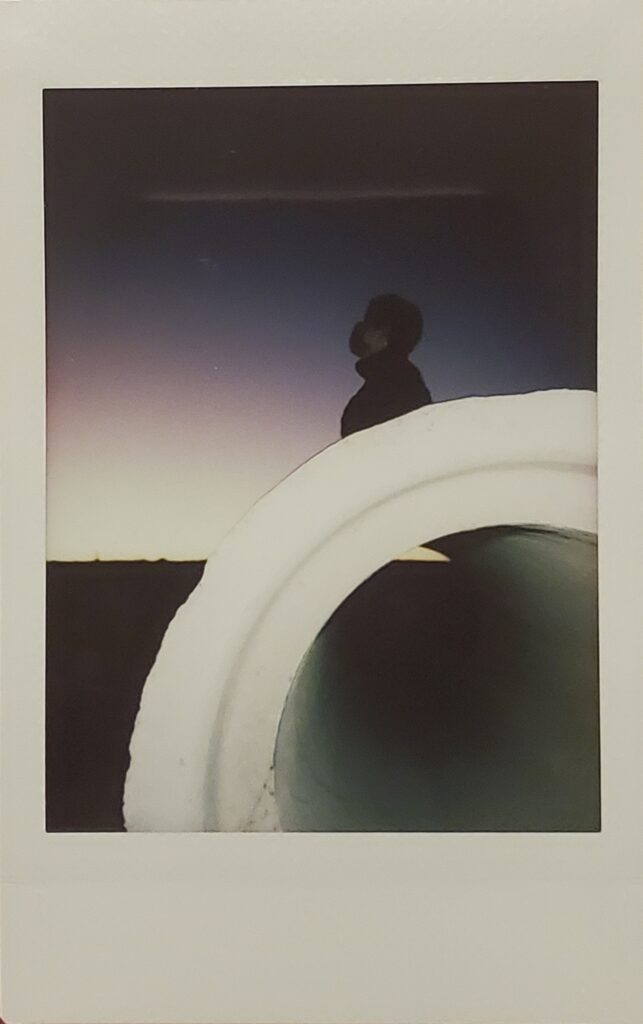
When they ask what happened, learn to start with a deep breath. Begin with words as tender as medicine. Watch the way the officer, a young man who introduces himself as Dakota, greets you as if you haven’t been waiting hours. In the police station, ignore the rows of stern portraits and glimmering badges lining the wall. Think of the eight hours it took of surviving, so you can tell yourself that this five-hour wait isn’t so bad after all.
Ignore the glimmer of swords and knives in clenched hands, dancing together around his kitchen island. Remember how you wished it was an actual island with shores and tides. Imagine yourself on a boat, watching him shrink into a silhouette, until he is a memory of an island you maybe once visited. It was nice you’d say. Good airfare, plenty of souvenirs. Ignore feeling as if you were exiled to that island where you relive it over and o v er.
Talk about the cherry blossoms instead, and how the buds unfurled in your palm that March morning. Fix the flower in the valleys of his brass-colored curls. Tether stems into knots until you crown him with pink petals. Feel nausea rocking your body and tell yourself it is only saltwater. Tell yourself that trauma isn’t a plot device foreshadowed by shrill piano keys. Sometimes, it’s only a halo of cherry blossoms moments before he tugs it apart.
When Dakota looks at you, quell the waves. let it crest over your eyes instead, and begin to spill over. leave the rose-colored filter on the pile of cherry blossoms at your feet. Fight the fog pulling at your memory and ignore the tide closing off your throat.
Suddenly, a memory from weeks before floats up like seaweed, of him googling symptoms. It’s okay, you’d said. Your health is important. Get checked out, don’t worry about me. Focus on your health first. Watch denial washing over glassy blue eyes, a no tilting his head back and forth.
Let his denial bleed into you, too.
Laugh at the absurdity as a nurse tacks a bandage across his skin. When she leaves, freeze when he falls to his knees and grabs for your hand. Shrink from him, tell him no, don’t and watch as panic sets in. See him clattering bottles on the shelves, threatening to drink them. Knock them from his hand before they reach his mouth, promise that it’s okay, let’s get you home, don’t.
So that’s how it starts. With gritted teeth and don’t leave me punctuated with threats to jump into traffic if you leave. Make your way back to the adobe walls of his home as your car hazards blink out in hazy yellows: help, help, help.
Hear the dull smacks of his body thrashing on the dashboard. Watch as blood blossoms on the vinyl of the glovebox. look down at the bloodstains webbing shaky fingers. Wonder how you went from cherry buds and laughter…to this.
Dakota starts scribbling, hovering above you. Were there any weapons? Remember him stumbling for knives, catching the glint of metal caressing toward you before turning them on himself. Remember him pointing the machete into his belly. Run to him, tug it away, and feel him throw you so hard it still makes you breathless. Feel your mouth peeling apart screams you don’t recognize as your own. Remember your mother’s face rushing back from another time and place. It was another set of hands and floors, but still.
Remember how she’d screamed then, too.
When you’re rushed home finally at three a.m., truly believe you have survived. See yourself as a conqueror in the courtroom. Imagine the healing on your face and truly believe it will come.
Instead, realize court only mimics justice if you squinted just right. For the eight hours stolen, watch three years fall in its place. Think back on the absurdity of won’t you testify? without warning of the heaviness that will occupy every empty space in your body. That you are agreeing to miss class, miss job interviews, to see him across you in the courtroom, over and
Become overfed with questions, not realizing they’ll echo you on the journey home. Answer Dakota’s questions. under the fluorescent lights of the domestic violence shelter, answer even more. Fill out restraining orders and highlight X’s on outlines of a body that is meant to erase you. Wonder how his hands had the power to erase it completely.
A year later, after you’ve cried in bathrooms and written into the late hours, submit the broken parts of yourself to magazines. In all the waiting, a positive question lights a flame in you. Words like publish and invited to speak enter all the empty spaces he made. At the reading, bleed into the podium and wait for the light to come fluttering back into you but, instead, feel as if you’re standing in front of the judge with your victim statement all over again.
Hug crying women who echo me too and write your signature next to your printed words. When they ask where will you go? answer I can’t stay here, not with him. There’s a place in Santa Fe, I’ve always loved writing.
In the years of how did he choke you? How did he break your wrist? Did you try calling anyone? When did he start getting violent? Why don’t you move? What knife did he use? What type of sword? When he himself asks through lawyers if it’s okay to send a letter, feel the weight of it three years collapsing on you.
Suddenly, feel Alejandro’s hand slipping into yours. He has been waiting three years, tucked away in your corner when no one else was. When he opens his mouth, brace for the shrapnel of more questions, but they never come. Instead, hear two words dripping, like medicine, that you have been waiting years to hear.
“Come here.”
Long Road Home
The bullet holes lodged in the wall could’ve been anything: smudges of black sunflowers…pieces of charcoal striking paper…black irises gazing at us. They could have been anything but the truth.
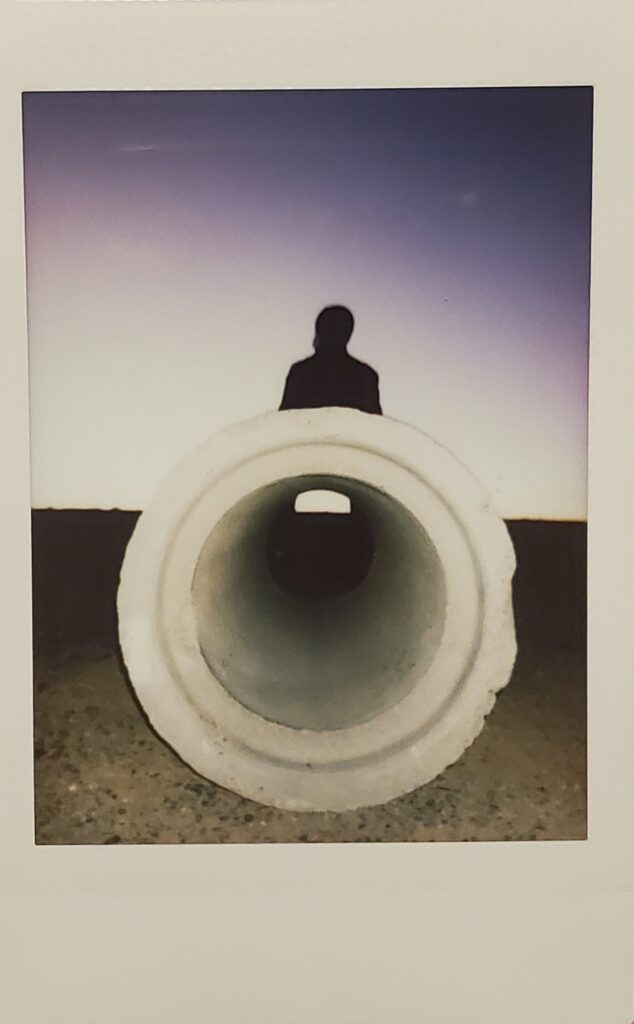
Standing there, clutching Alejandro’s hand along the western edge of Albuquerque, I told myself if I’d squint enough, the bullet holes lodged in the wall could’ve been anything. As dust stung my eyes, light scattered my vision and framed the blackened holes in front of us.
The holes could’ve blurred into smudges of black sunflowers. They could’ve been pieces of charcoal striking paper, leaving jagged pieces. They could’ve been black irises gazing back into us.
They could’ve been anything but the truth.
Above us, a blood-orange sun sank into volcano silhouettes, spilling black across the landscape. Ale’s hand reached delicately to the punctured wall inches away from his face. He traced the edges of the bullet hole, and I was almost afraid that he’d fall into it. I tugged his elbow back, feeling a hole opening up in my chest.
“I don’t get it, Bri,” he murmured. “I was running with Chile… you know how she is.” I nodded, picturing the pile of fluff fighting against a leash.
Below our feet, bits of pebbled cement wall hid among the tumbleweeds and lined the cracked sidewalk. I crunched them underneath my boot. “What did you do?” He glanced down the stretch of road where it veered left, curtailing his neighborhood by a huddle of adobe apartments. He pointed to it, laughing. “I just ran. We were open targets,” he said, eyes scanning rooftops. “I think she knew, though…she stuck right by me.” “See those apartments? I had to hide between them for half an hour. I think it was a beat up white truck.” He knotted his eyebrows. “They were just idling downhill, watching me.” His face crumpled for the first time since we’d come here. From where he stood. the bullet hole lined up perfectly, feet away from where it happened.
“Why would someone do that? Do you think it was…”?
“I don’t know. I don’t wanna believe something like that could happen here.” As I stared across the open desert and he stared at the crumbling wall, we both understood. It only happened three days ago, August third. A man walked into an El Paso Wal-Mart, training his aim on families gearing up for back-to-school. Mothers were armed with carts with new backpacks, markers, glue, and notebooks. Children toddled closely, reading supply lists and complaining about summer’s end. Tax-free weekend meant more shoppers, more bullets, more targets. Back then, the headlines were miles away, existing only as cautionary tales told before wading through crowds.
Now, headlines became bullets spraying their way toward him. It wasn’t just a reporter bouncing her voice across a teleprompter. It was in the way truck tires peeled off, casting dust into a cover before rumbling away. It was in the way he’d run harder than he ever had, straining against a body webbed in pain. It was in the way he’d called me, heart in his throat as he gasped someone shot at me, I’m okay.
We didn’t, or couldn’t, know. Standing on the edge of town, we waved in the wind like paper targets lost in a shooting range and I finally realized the weight of domestic terrorism in a way that cracked open spaces in me. It didn’t have to be men from El Paso gunning down families, but it didn’t matter anymore. The fear was instilled in us already. To people like them, that was enough.
His hand pressed against my face, wiping away tears. When I met his gaze, I still saw specks of brown and gold, but they carried the weight of bullet shells within them. “Let’s get home.”
Over the next week, he’d brought up the idea of meeting him along historical checkpoints if he couldn’t come back. Bracing myself, I’d looked up tickets to Chihuahua, googled images of gunmetal fencing running along the southern edges. It was a mismatched patchwork of barbed wire along cracked desert. They bled like rows of razor blades jagging into the ocean, where only the waves danced freely from one side to the other. Militarized officers brandished guns between mothers and children, wives and husbands cradling toddlers outstretched for more than this. I slammed the laptop down and Alejandro glanced at me, startled.
“No,” I gritted through my teeth, cracking the silence.
“Wait, what?”
“I can’t do this. No.”
“Well… it might not be forever.”
“What if it is? You have to try. You said yourself, America is all you’ve known.” “You don’t get it Bri,” he choked, “you don’t understand having to grow up constantly told you don’t belong, to go home. To listen to strangers talking about us without ever knowing who they’re speaking to.” His mouth hardened into a thin line.
“If they really want me gone, if they’re willing to put us in cages…” he whispered, voice splintering. “I don’t think I want to come back.”
He burrowed his face in my neck and his shoulders sagged under invisible weight. “You could come if you want. My family knows you write. You could see my relatives and where we come from. Do you remember what my mom said to you?”
I pictured his mother’s smile and red ponytail, eyes lighting up when I’d told her my major. See Bri, don’t have kids. It was always his father’s dream to write, you could see our family, listen to our stories and write them.
I remembered faintly, surprised she reacted positively. In embarrassment, I swallowed more posole as she gushed over the idea of seeing her family. All at once, images wafted through me; of his life reduced to a suitcase, bullet holes vibrating past, headlines springing to life, long twists of a black wall coiling through desert, glaring assault rifles marching like tiny, black ants. “Bri,” he repeated. “would you come with me?”
I didn’t have to say it, because he already knew.
“I’d follow you anywhere,” I promised. A smile stretched across his face, and he closed his eyes. “Tu eres mi hogar,” he murmured.
You are my home.
Spoonful of Navajo
Spoonful of Navajo
Although we have been flung far from our tongues, force to sing our way back on daily rations of language, we swallow spoonfuls of Navajo sipped with the light of each American sunrise
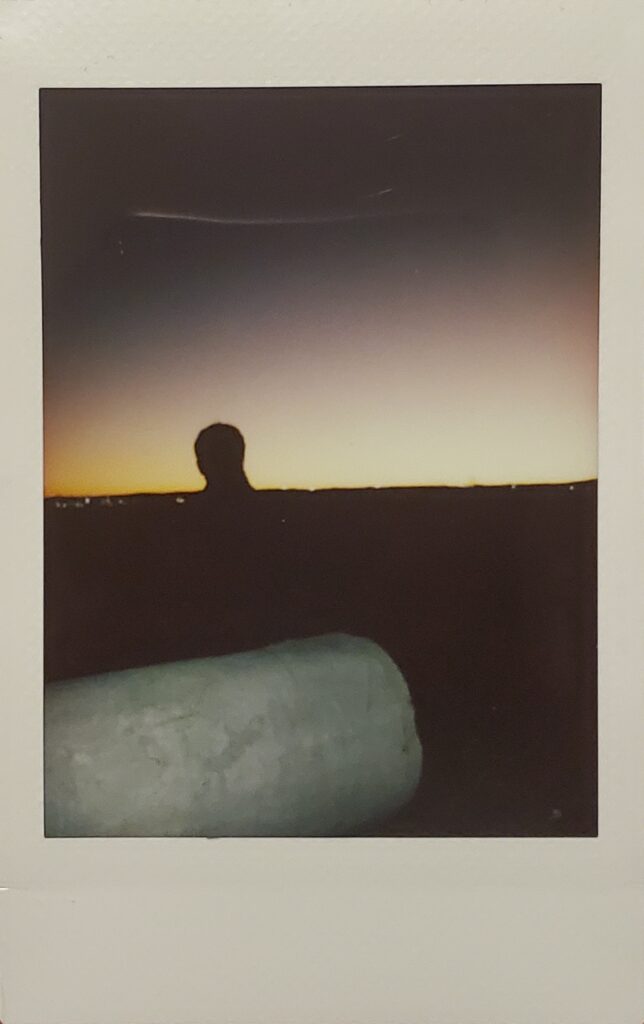
Spools of Heartstring
Spools of Heartstring
My frayed heartstrings feathered my earlobes with the wind-whispered murmurs of a million lost red threads beating in unison against a heart made whole: we will never be unwoven again.



Brianna G Reed
Brianna G Reed is the Diné author of the short essays “Would You?” “Summer in March,” “Questions,” and “Long Road Home.” They have previously appeared in Leonardo and Tribal College Journal. Raised in a military family in Hope Mills, North Carolina, she now studies at the Institute of American Indian Arts and lives in Albuquerque, New Mexico, where she spends her time running among the reeds of the bosque river, searching for poetry in the water.
